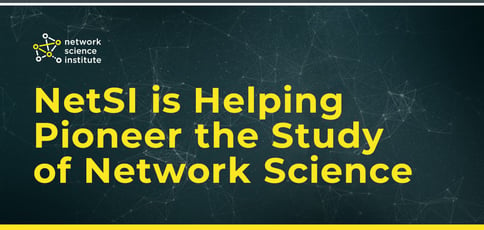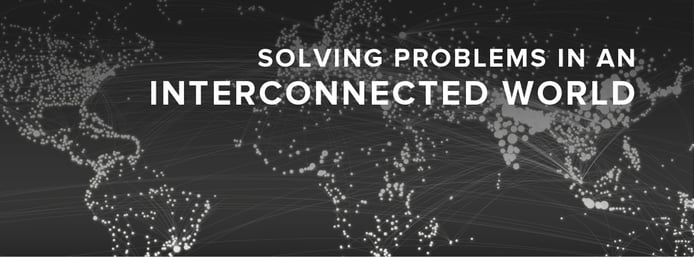
TL; DR: The Network Science Institute (NetSI) at Northeastern University was born out of the desire to study the principles, properties, and purposes of network connectivity. If you’re thinking servers or social media, think again — while the institute relies on recent advancements in storage capacity and computing to power its research, it isn’t focused on computer networking whatsoever. Instead, NetSI aims to use the interdisciplinary nature of network science to help researchers solve problems in an interconnected world.
When most of our readers hear the word networking, they think of servers, switches, routers, modems, and cables.
But in one field of science, networks represent far more than interconnected servers — just ask the folks at Northeastern University’s Network Science Institute (NetSI).
The forward-thinking institution is focused on fundamentally changing the ways scientists measure, model, predict, and visualize the interconnectivity of physical, social, and technological systems (which collectively make up the field of network science).
Haven’t heard of it? That’s because NetSI is essentially pioneering the discipline with the first Ph.D. program in network science in the U.S. NetSI’s interdisciplinary research teams integrate theories, models, and problem-solving approaches with the shared goal of understanding systems by discovering their underlying principles, properties, and purposes.

Kate Coronges, Executive Director, gave us the scoop on NetSI’s network science program.
“As the first Ph.D. program in the U.S., we’ve started this process of exploring what constitutes the basic set of skills and capabilities for someone who is a network scientist,” said Kate Coronges, Executive Director of NetSI. “We all come from many different disciplines, all drawn to network science approaches because the field offers a way to understand systems in terms of the connections between its actors or units, rather than the specific attributes of those actors.”
NetSI, a joint initiative between Northeastern University’s College of Social Science and Humanities, Bouvé College of Health Sciences, Khoury College of Computer Sciences, and College of Science, encompasses various lab groups and projects.
The institute’s research on networking is as wide-ranging as the scientists contributing to it, focusing on biological, technological, informational, and social systems (remember, no servers here!). Study areas include everything from genomic interactions and infectious disease transmission to spatial resilience, voting patterns, and social justice.
Helping to Pioneer the Study of Social, Physical, and Tech Networks
Kate said that network science has developed in siloed fields since the 1900s — long before the subject area began to merge as one.
“In sociology, for example, there have been huge advancements in the empirical methods used to analyze social dynamics and understand interactions among people from the systems perspective,” she said. “In physics and computer science, there were parallel developments using these network methodologies to understand systems, whether they be biological systems, technological systems, or information systems.”
The field continued to develop in parallel across different domains and disciplines, and only started becoming a more cohesive field in the 1990s, with shared methods and terminology, she said.

NetSI aims to understand systems by discovering their underlying principles, properties, and purpose.
Northeastern University took an interest in the field, and strategically recruited key leaders, hiring Alessandro Vespignani, an expert in theoretical condensed matter and biological physics, who became the director of the institute for the emerging field.
“Conversations went on for four or five years negotiating what shape the institute would take before NetSI was officially established,” Kate said. “When you go to a conference in network science, there’s still a philosophical question about whether the field is a science or a method; theoretically-driven or a set of tools. That’s still an interesting conversation to be had.”
Today, network science as a discipline is based on the idea that researchers can predict the behavior of a system through the connectivity of the units within it.
“There are many interactive components, many interacting agents within systems, and the goal is to better understand how those systems function so we can characterize them and potentially build predictive models,” Katie said. “This applies to many disciplines and areas, and that’s why our group includes communications professionals, physicists, computer scientists, and political scientists.”
An Interdisciplinary Field Serving a Diverse Range of Students
There’s no such thing as a typical NetSI student; diversity of interest is what attracts most learners to the emerging discipline.
“I love the first day of the program each year,” Kate said. “It’s common for students to feel like they don’t belong — a lot them have double majors, and will say, ‘Well, I’m a math and feminist studies major, I don’t know where I fit in.’ And we’re like, ‘Yep, you belong here.’”
Kate herself became interested in networks during her research studying health behaviors and public health, but she said she’s always been interested in a variety of fields. While working as an assistant professor at West Point, where she helped create an undergraduate program minor in network science, Kate said that some of her colleagues compared the development of the network science field with that of operations research.
“It’s an interdisciplinary space that includes logistics, a lot of optimization, mathematical algorithms, and some social science,” she said. “From that perspective, network science has gone through a similar trajectory.”
The interdisciplinary nature of network science helps researchers solve problems in a highly connected world. Recently, that has meant contributing to research on the COVID-19 pandemic. NetSI staffs some of the nation’s greatest minds in infectious disease modeling, who have formed a COVID-19 research team to work in tandem with government health agencies to manage the crisis.
The institute’s director, Alessandro Vespignani, and Sam Scarpino are leading the modeling efforts. Computational social scientist David Lazer is focusing on social media tracking, while László Barabási is using tools in network medicine to explore the option of repurposing existing viral drugs to fight COVID-19.
Supporting and Growing the Network Science Community
Moving forward, NetSI’s 10 faculty, 30 researchers, and 30 doctoral students aim to bolster the field by applying network science approaches to new applications, creating tools and algorithms, and building data repositories that will be accessible to the network science community at large.
“We feel like it’s really important to share the developments and advancements that we make internally with the global community (primarily in the U.S. and Europe),” Kate said. “The other part of our mission is to develop a global community of exchange, both through scientific collaboration and through training programs. We have an NSF grant specifically for that purpose, to build these global partnerships. ”
The Network Science Institute is working on events such as the NetSI Collabathon.
“It’s similar to a hackathon, but instead of competing to find the best algorithm or result, students and faculty come together to do science in a hivemind-like setting and leverage interdisciplinary approaches,” Kate said. “We built the program into a grant, and now we’re trying to keep it going in a virtual way across the U.S. and Europe.”
Kate said that she believes that formalizing interdisciplinary approaches to problem-solving will lead to the future of science in general. “Conceptually, bridging communities and coming up with new ways to collaborate is the way forward,” she said.
Just as a network server provides various shared resources to workstations and other servers, network science provides collaboration opportunities that strengthen research efforts via a common platform.
HostingAdvice.com is a free online resource that offers valuable content and comparison services to users. To keep this resource 100% free, we receive compensation from many of the offers listed on the site. Along with key review factors, this compensation may impact how and where products appear across the site (including, for example, the order in which they appear). HostingAdvice.com does not include the entire universe of available offers. Editorial opinions expressed on the site are strictly our own and are not provided, endorsed, or approved by advertisers.
Our site is committed to publishing independent, accurate content guided by strict editorial guidelines. Before articles and reviews are published on our site, they undergo a thorough review process performed by a team of independent editors and subject-matter experts to ensure the content’s accuracy, timeliness, and impartiality. Our editorial team is separate and independent of our site’s advertisers, and the opinions they express on our site are their own. To read more about our team members and their editorial backgrounds, please visit our site’s About page.

